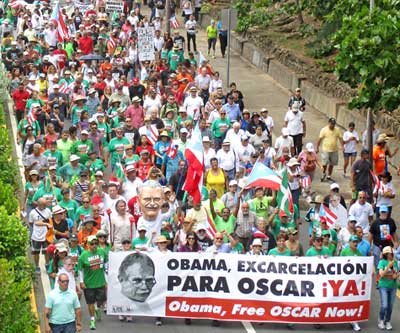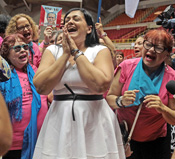
Vol. 81/No. 5 February 6, 2017
(lead article)
Freedom for Oscar López! Release is set for May 17
López: Step up fight to end colonial rule in Puerto Rico


Above, May 29, 2016, march in San Juan, Puerto Rico. Inset, Oscar López’s daughter Clarisa at Jan. 17 press conference in San Juan, announcing that the fighter for independence from U.S. colonial rule would be released by May 17 after nearly 36 years in federal prison.
Supporters of López’s fight for freedom celebrated across Puerto Rico; in New York; Chicago; Kissimmee, Florida; and in Cuba. Many also plan to stay vigilant until he actually walks free. In New York, 35 Women for Oscar López will rally and celebrate Jan. 29 in Times Square.
“Everyone is happy. It demonstrated the strength the people have when we are united,” cattle rancher Armando Arcelay said by phone from Aguadilla, Puerto Rico.
“My father emphatically wanted me to publicly thank all the Puerto Rican people, the people of Latin America and especially Cuba, Venezuela and Nicaragua,” Oscar’s daughter Clarisa López told a press conference in San Juan.
At the Jan. 17 volleyball finals in San Sebastián, Puerto Rico, where López was born, the fans only wanted to talk about the news of his impending release, reported El Nuevo Día.
“I can’t imagine 35 years in prison, much less all those years in solitary,” Sergio Obell Cruz told the paper. “We will be waiting here for him with a huge party.”
López, 74, moved to Chicago when he was 14. He was drafted into the U.S. Army in 1965 and sent to Vietnam. By the time he returned to Chicago he was an opponent of the war and joined fights against discrimination in hiring and housing, against police brutality, for bilingual education and for independence for Puerto Rico.
In the 1960s and ’70s, support for independence grew among Puerto Ricans on the island and in the U.S., inspired by the 1959 Cuban Revolution. One of the FBI’s largest Cointelpro disruption campaigns targeted independence supporters and unionists on the island.
In 1980, 10 Puerto Rican independentistas were arrested in the U.S. and accused of being members of the Armed Forces of National Liberation, a group which took credit for bombings of businesses with investments in Puerto Rico.
On May 28, 1981, López was arrested and accused of being a leader of the group. With no evidence that he had participated in any violent action, U.S. prosecutors made their main charge against him “seditious conspiracy.”
López and the others, arguing they were prisoners of war, refused to take part in the trials. All were found guilty.
In 1999 President Bill Clinton pardoned most of the Puerto Rican political prisoners, but López did not accept because two prisoners, Carlos Alberto Torres and Haydée Beltrán, were not included. Beltrán was freed in 2009 and Torres in 2010.
After Torres’ release the campaign to free López picked up steam. In May 2013 thousands protested in Puerto Rico. Similar actions took place in the U.S. and Cuba.
Widespread support to free Oscar
Leaders of the Catholic Church and other religious denominations in Puerto Rico, the U.S. colony’s main capitalist political parties, trade unions in Puerto Rico and the U.S., and prominent individuals around the world, including Bishop Desmond Tutu from South Africa and Pope Francis, were among the many who called on the U.S. government to free López.The fight got a boost with the release of the last of the Cuban Five in December 2014. The five revolutionaries spent up to 16 years in jail in the U.S. on frame-up charges of “conspiracy to commit espionage” because of their work to protect Cuba from violent attacks by counterrevolutionaries based in the U.S.
El Nuevo Día spoke with Fernando González, one of the Five, who is now vice president of the Cuban Institute for Friendship with the Peoples, during a celebration in Havana Jan. 17. González shared a cell with López in Terre Haute, Indiana, for four years.
“This is a great victory for the people of Puerto Rico and all those with a good heart throughout the world,” González said. He saluted López’s “resistance, his revolutionary caliber and his steadfastness in what he believes.”
Fight for independence
The victory for López takes place as the Fiscal Oversight Board appointed by Obama continues to press the colonial regime to slash health care, welfare, pensions and wages. Many in the capitalist class in Puerto Rico worry that López’s return could strengthen the fight for independence and against the fiscal board’s shock therapy.Once he is released López plans to visit all 78 municipalities in Puerto Rico to thank people for their support and promote the fight to end colonial status.
In a Jan. 23 column José Saldaña, former University of Puerto Rico president, smeared López as a terrorist and argued against those who support independence. “Patrioteers who are using Oscar are trying to sell us the illusion of a free and sovereign homeland,” he wrote. “They don’t tell you that this will risk your U.S. citizenship, there won’t be Medicare or Medicaid.”
In a letter to a supporter in May 2015, López noted that Cuba before the revolution was “a nation in shambles, with an economy in chaos and responding primarily to the economic interests of the USA, [and] a poor educational system.” Today it is a “beacon of hope and an example to emulate” and “it is the most literate country in all the Caribbean and Latin America.”
At a Jan. 21 celebration at the community center El Maestro in the Bronx, Ana López, a leader of the New York Coordinator to Free Oscar López, read an email he sent her from prison. “Now more than ever we must work for the future of our beloved homeland,” he said. “We can decolonize our people and our nation and transform it into the edenic garden it has the potential of being.”
“Oscar should never have been in prison,” Rafael Cancel Miranda, who spent 25 years in jail in the U.S. for his actions in defense of independence for Puerto Rico, told the Militant by phone Jan. 23. “Fighting for independence is not a crime. The criminal is U.S. imperialism and colonialism.”
Related articles:
SWP: Victory for Puerto Rico, all working people
Step up fight to free Leonard Peltier!
NY prison authorities punish, move Jalil Muntaqim
Front page (for this issue) | Home | Text-version home